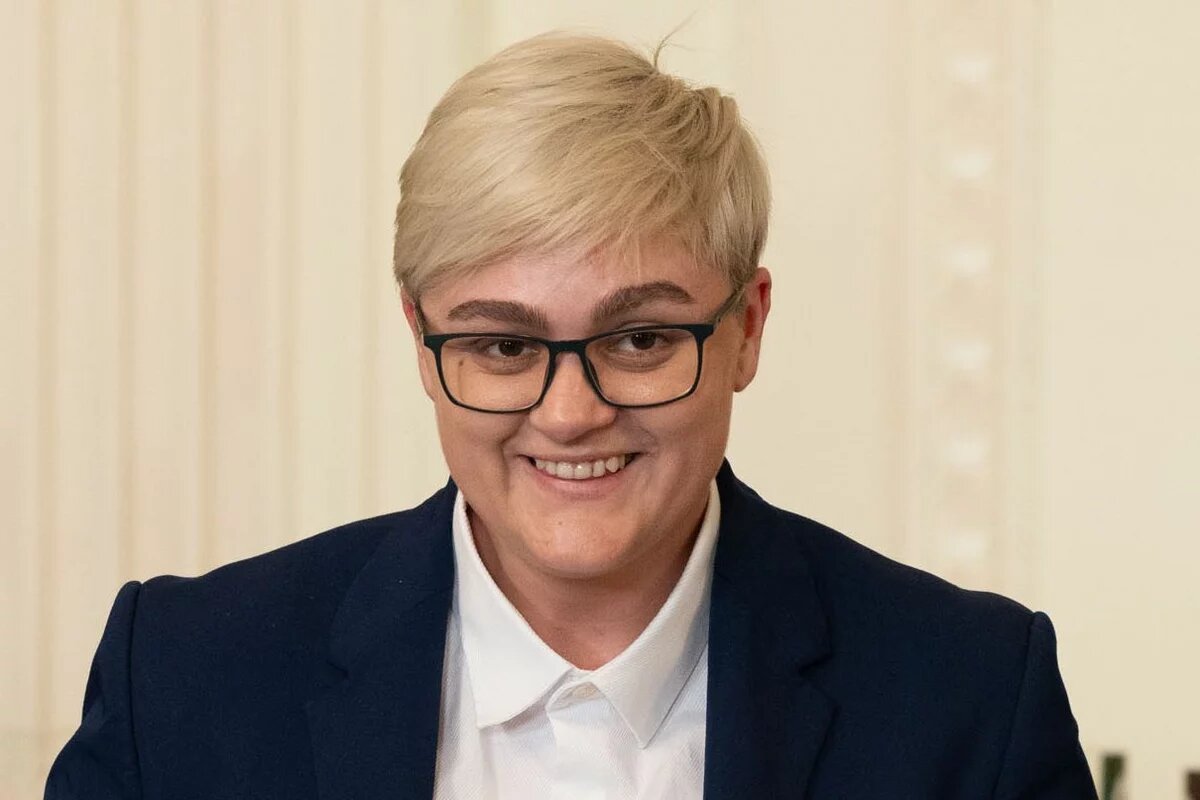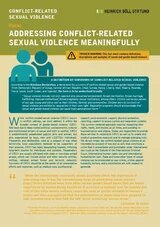Ajna Jusić’s mother survived conflict-related sexual violence during the 1992–95 war in Bosnia and Herzegovina. Ajna is one of many children born as a result of such war crimes. Her organisation aims to improve the lives and legal situations of the victims and their children. The idea is to create an environment that puts an end to the existing culture of violence.

Thanks to activists and the engagement of survivors, Ajna Jusić and her association managed to break the silence about conflict-related sexual violence in society as well as in politics in Bosnia and Herzegovina. The result was a breakthrough: in 2006 Bosnia and Herzegovina became the first country to formulate a law that creates a separate legal category for survivors of wartime rape. On paper the country did a good job, what is lacking, though, is the actual implementation.
The prosecution of war criminals, soldiers and rapists is not sufficient. The international community provided support in terms of the prosecution of high-level military officials, but there is not much progress when it comes to rapists who were regular soldiers. In different regions we see a disturbing denial of the crimes committed during the war. This happens because of the conflicting private interests of politicians who still use war topics and fostering false narratives to cover up their corrupt activities.
Until now only 1,000 women have received the civilian victim of war status which is a ridiculously low number, bearing in mind that between 20,000 to 50,000 women were raped. We have to improve the legal status and the rights of survivors. What is problematic is that the international community tends to point to only one political side, to the Serbs, but Croat and Bosniak representatives are also not open to a professional approach to facing the past.
You are the president of the organisation Forgotten Children of War (Zaboravljena djeca rata), which addresses the topic of sexual violence during the Bosnian war (1992–1995). During that time, more than 100,000 people were killed and some 2 million expelled from the country – and approximately 20,000 to 50,000 people, mostly women, were raped. What does your daily work consist of while you advocate for better rights for the victims?
Ajna Jusić: Our association tries to gather data on children born out of sexual violence in Bosnia and Herzegovina. This is a very heterogeneous group: we are dealing with children from peacekeepers, children whose fathers were humanitarian workers during the war or afterwards, and we also gather data on children born from forced marriages and sexual exploitation. Our main focus is to improve their legal and social visibility and thus strengthen the acceptance of children born out of wartime rape, with the aim of ending stigmatisation and discrimination.
That’s quite a challenging task. What are your main objectives?
As a matter of fact, we don’t just advocate for the human rights of children born of war, we also advocate for better rights for survivors and for better conditions in their daily lives. And of course, even though it’s not a major part of our work, we push for the prosecution of those who committed war crimes.
How are the political parties dealing with the past?
Thanks to activists and the engagement of survivors, we managed to break the silence in society as well as in politics. The result was a breakthrough: in 2006 Bosnia and Herzegovina became the first country to formulate a law that creates a separate legal category for survivors of wartime rape. On paper the country did a good job; we really have convincing legislation in this regard. What is lacking, though, is the actual implementation. We need to create an environment in which survivors are not discriminated against or considered guilty because they survived wartime rape.
We need to create an environment in which survivors are not discriminated against or considered guilty because they survived wartime rape.
What is the situation of the perpetrators?
This is – besides the implementation of the law – another problematic field. The prosecution of war criminals, soldiers and rapists is not sufficient. In fact, we had the support of the international community in terms of the prosecution of high-level military officials. Yet when it comes to rapists who were regular soldiers, we can’t be satisfied. In different regions we see a disturbing denial of the crimes committed during the war, which is highly problematic. This happens because of the conflicting private interests of various politicians. In addition, some politicians still use war topics about different types of war trauma to cover up their corrupt activities, which they engage in every single day. They have an interest in fostering these false narratives. On the other hand, we see the political victimisation of just one ethnic group, even though we have victims on all ethnic sides. All these tendencies seriously harm the interests of the survivors.
How do you evaluate the role of the international community?
On the one hand, they did a good job in pushing for some change. Their pressure was the driving force behind legislative improvements on the entity level.1 On the other hand, they did not push our politicians and institutions hard enough to adopt a national law on the civilian victims of war torture. This would have served as a history lesson for every single ethnic group in the country. Until now only 1,000 women have received the civilian victim of war status – this is a ridiculously low number, bearing in mind that between 20,000 to 50,000 women were raped. Here we have to further improve the legal status and the rights of victims. What is problematic is that the international community tends to point to only one political side, to the Serbs, even though I cannot say that the others are any better. Croat and Bosniak representatives are also not open to a professional approach to facing the past.
We have to provide some background information to those readers unfamiliar with the historical events: During the '90s, Serbia and Croatia tried to establish a Greater Serbia and a Greater Croatia respectively. Croatian President Tudjman and Serbian President Milosevic had an agreement about the division of Bosnia and Herzegovina. As a result, Bosnian territory was ethnically cleansed, and civilians were tortured, killed, expelled and raped. Rape was systematically used as a weapon of war. In many cases, the International Criminal Tribunal for the former Yugoslavia (ICTY) enabled sexual violence to be prosecuted as a war crime for the first time. Are these topics taught in the schools?
Not really. When I first found out about the history of the region, it drove me crazy and made me angry that I did not know much about the rapes and the crimes committed in general. Until then I didn’t have any kind of information on that.
Do you see any chance of achieving the goal of prosecuting at least the majority of the perpetrators?
The general strategy in terms of prosecution was to go from the top to the bottom. The most important thing we can achieve with our work is to create a social environment in which we as a society understand that we are surrounded by 20,000 to 50,000 rapists. It’s not a healthy way of living together if they are not prosecuted. And that’s why we raise the question of security. Because children of war who are publicly speaking out don’t just talk about ordinary people; in fact they speak about war criminals – about rapists who run free in society. This is a security issue, which the institutions have to deal with.
How easy is it for the survivors to speak out about their wartime experiences?
It’s not easy at all to speak freely. That’s why our organisation is here to help. To give support, to empower them. And that’s the reason it’s so important to discuss the topic not only in Bosnia, but also throughout the entire region, since it’s a well-known fact that war criminals who committed crimes in Bosnia also live in Serbia and Croatia. If the state institutions do not prosecute these criminals, we as survivors have the duty to push the process forward. As children born from wartime rape, even if we know details about our biological fathers, the rapists, we have an obligation and the right to call for their prosecution.
If the state institutions do not prosecute these criminals, we as survivors have the duty to push the process forward.
How did you react when you learned about your mother’s war experience?
I was 15 years old at that time and going through puberty. I didn’t need this information about my origin, because I had then – and still have now – a wonderful father and a wonderful mother. By virtue of my family, I had everyone that I needed to grow up in a healthy way. However, since we have this category in state documents in schools, in universities, in the public sector, that requires you to provide your father’s name, I decided to find out the name of my biological father. It was not about finding out the truth, but about finding an answer to the requirements in our documents where the father figure is constantly present.
Have you experienced discrimination?
As a matter of fact, I was almost never discriminated against as a child of the enemy. Instead I was discriminated against because I was a fatherless child. Plus, I was discriminated against through the discrimination and stigmatisation that my mother faced all the time. Only in very rare cases where people knew that my mother had survived a rape, did I experience the “child of the enemy story”. To this day I don’t say the rapist’s name out loud2, because of safety issues and because it was my mother’s decision not to reveal it – I respect the fact that it’s her story.
You spoke about the discrimination that your mother and other victims experienced. Can you explain in which areas this discrimination takes place? Do you have some examples?
First of all, as a country, as a society, we do not respect women at all. We do not respect the female body and women’s freedom. All in all, Bosnia is not an equal society. So that’s the foundation of everything. In addition to that it’s still seen as shameful when somebody survived rape. The woman is exposed to the negative judgement of the family and affected by social rejection. It’s said that they don’t have their dignity anymore. Rape is seen as a shame for the entire family. This is still a fact even in 2024. We have nearly the same toxic environment as during the war since some people don’t respect the credibility of women’s statements and experiences. Society would always find a way to put the blame on the women: Why did she wear this? Why did you go there? In my mother’s case I find it very telling that the people never asked her about the origin of her child. While the society in general played a negative role, her family, on the other hand, was a huge support for her. And she is a fighter and managed the challenges admirably.
Obviously, you’re also a fighter with a strong commitment to your cause. In 2023 you received the Peace in Progress Award from the International Catalan Institute for Peace (ICIP). Recently, you were honoured in a ceremony at the White House by the First Lady of the United States, Dr Jill Biden, and Secretary of State Antony Blinken. Along with activists and human rights defenders from all over the world, you were one of this year’s International Women of Courage Award recipients. A huge honour for your work! What would you consider your biggest achievement?
For me that would definitely be the adoption of the Law on the Protection of Civilian Victims of War in the Federation of BiH (FBiH).3 I think the heritage we have now is a law that prevents the crimes from being forgotten. It’s also clear that the legislation brings also a certain level of acceptance for me personally. I’m recognised in the law as a consequence of war rape, as a category. This means that we can provide future generations with the best information about us, about our stories. In addition to that, the recognition as a category in jurisprudence means that we can protect ourselves from discrimination. According to the law, we now have the right to receive healthcare support, free legal support, free psychological support, support for housing and for finding jobs. It’s the best we could get. Now we are eager to promote the implementation of the law.
What must be done in this regard?
Our organisation has its own advocacy strategy. From the first day when we started to implement it in 2018, we have raised awareness about the needs of victims. We have created the space for dialogue and understanding of the problems, and of the rights and needs of children born of war. Basically, we started an interethnic dialogue, because we see ourselves as an interethnic organisation. We have multi-ethnic members, since our mothers survived crimes committed by different ethnic armies. From the very beginning, we aimed to include decision makers, young politicians, institutional workers, activists and ordinary citizens. We realised that education needs to be a top priority. I am convinced that we can achieve a lot with regard to these topics, especially here in Bosnia and Herzegovina. We have a huge impact internationally. Our work can especially be seen as an asset in terms of Bosnia’s path to EU membership.
Basically, we started an interethnic dialogue, because we see ourselves as an interethnic organisation.
On what principles do you base your advocacy work?
It is important to mention that we work together with politicians from all ethnic groups and parties. We as an organisation don’t have an ethnic focus. We cooperate with politicians based on their institutional role, not on their political orientation; this is of the utmost importance. We consider them our partners, because through them we can spread our narratives and achieve our goals.
Bosnia and Herzegovina has a rather complicated system of government. It consists of two entities – the Federation of Bosnia and Herzegovina (FBiH), and Republika Srpska (RS) – that have different legislation. The Law on the Protection of Civilian Victims of War is in place in the Bosniak-Croat dominated FBiH and also in the Brčko District, but not in RS whose political leadership strongly denies the war crimes, especially the genocide of Srebrenica. How does this go together with your activities? How do you deal with the existing culture of violence?
As a matter of fact, we have different strategies in different regions. In the Federation we used a top-down approach. First, we gained the support of the international community, we advocated with the United Nations, then with the EU, and then we received support from various embassies – at the end of that chain we reached activities by local institutions. However, this methodology can’t be implemented in Republika Srpska. It would not work there. If we want to see a positive result, we have to find another approach. Most of the survivors of wartime rape in RS are Bosniak women and men, this is a fact. Yet we don’t focus on that. It would be counterproductive. Instead, in RS we are focusing on the victims, male and female, of war crimes, specifically Serbian children born of war who are in need of assistance.
Currently, the law is blocked in RS. We will see what will happen in the future. The oldest law is in the Brčko District, which was enacted in July 2022, even though the law is not good. It was adopted due to pressure from the international community. The recognition of war survivors in Brčko District is rather symbolic, it’s not connected to specific rights. That’s why we are advocating for further legal improvements in the Brčko District. As a matter of fact, we are dealing with completely different collective systems. My advice for the future is that we should look more intensively at the positive impact exerted by the survivors in the society and make use of that. Their perspective is the most important focus of our work.
You are acting in a very strategic way, achieving more than other stakeholders in the political sphere. Would you consider entering politics one day?
We in our organisation have been working together for nine years now. It’s not an option for the time being. Instead, we are focusing on our stories and narratives. We survivors are in close contact, and we want to create an interethnic atmosphere in our country. What we need from society, politics and ordinary citizens is to have our trauma and our experiences recognised before the law. Plus, we need human rights and dignity, money, safety and, last but not least, a non-violent culture. These are our main goals for BiH. And we are doing our best to achieve them.
In the meantime, you are also providing support for survivors from Guatemala, Uganda and Ukraine. What is your role in this context?
Mainly we are connecting with individuals and organisations; sometimes they come here, sometimes we go there. The main idea is to learn from good and bad practices. Our role is to represent our work, especially our achievements. Our biggest challenge is to prevent three decades of survivors being invisible – like it happened here after the Bosnian war. So we are insisting on documentation, on a professional methodology. We are pushing politicians to have somebody speak up openly about the crimes. It’s always helpful if a man tells the truth about these sensitive topics.
What do you provide exactly?
We teach activists and organisations in Guatemala, Ukraine and Uganda how the crimes have to be documented. This is highly important to avoid the problems many survivors of sexual violence and children born of war are facing in Bosnia, since the documentation was not done properly at the time. It was not until more than 20 years after the war ended that we started dealing with these topics in a professional manner. That was much too late, however. For our partners in Uganda or Ukraine we stress the importance of registering, of documenting the crimes in a timely manner. Also, we share our knowledge about an effective and professional advocacy approach. We have already had one panel discussion with the First Lady of Ukraine, Olena Zelenska, about the most important challenges to improving the situation of the survivors and their legal situation.
In the case of Ukraine, we are talking about babies (born as a result of the rapes committed since 2022) and about children who are approximately 8 or 9 years old (born as a result of the rapes committed in 2014 after the occupation of Crimea). Basically, our international work is aimed at bridging the existing international gap in this context. We gather supporters around us, and we ask different governments to join in these processes to strengthen the situation of the victims. This is not only a Bosnian problem, it’s also a huge topic and a global challenge.
The interview was conducted in August 2024 by Marion Kraske, a political scientist, author and analyst.
Footnotes
- 1
The country of Bosnia and Herzegovina is divided into two administrative entities: the Federation of Bosnia and Herzegovina (FBiH), and Republika Srpska (RS), and the Brčko District. The Brčko District, a multi-ethnic self-governing administrative unit, has a special status as it is formally part of both entities.
- 2
He was a member of the Croatian HVO army (Hrvatsko vijeće obrane).
- 3
FBiH, one of the two autonomous entities of Bosnia and Herzegovina, is made up of ten cantons with mainly Bosniak or Croat majority populations.


